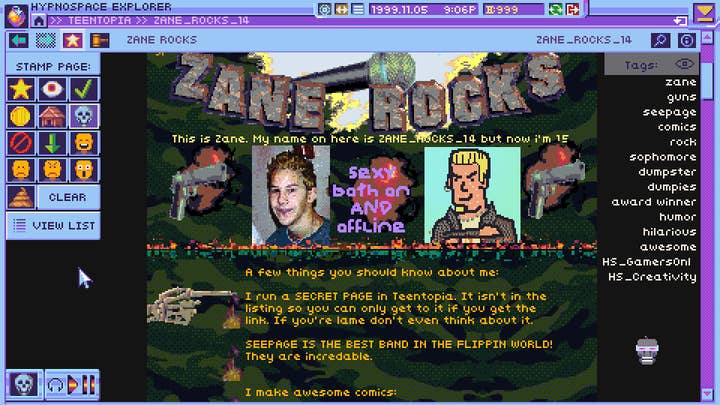No More Robots: Anybody making games needs to think about localisation
Up to a third of indie sales can come from China, says Mike Rose, so developers should build for localisation
The fact that China is a huge market for video games will have escaped the notice of precisely nobody. But the degree to which it is a vital territory for indie games may come as a surprise.
When No More Robots launched version 1.0 of Rage Squid's Descenders in May this year, the publisher's founder Mike Rose tweeted the geographical spread of sales across the first week. Taiwan, France and Russia were all higher than the UK, while China represented 35% of all sales -- more than double the market share of the United States.
"I really can't stress enough how important localization is now," Rose marvelled, echoing comments he'd made more than a year before, when 12% of all Descenders' players were found in China.
However, while localisation has been key to the success of No More Robots' games so far, Rose says that "It has [been important], but it's also been our downfall a little bit."
"I worked out that we lost something like 25% to 30% of sales on Hypnospace Outlaw because of localisation"
Specifically, Rose is referring to Tendershoot's Hypnospace Outlaw, the third game published by No More Robots, which presented several huge challenges when it came to localisation. By comparison, he says, localising Descenders was simple.
"Everybody knows what riding a bike is -- we don't need to give context for that. And there's not that many words in Descenders. There's about 10,000 words; it's UI, and people going 'Oof' and 'Ergh' and that kind of stuff. Descenders has 17 languages in it, or something ridiculous. Hypnospace is the polar opposite."
Part of that is due to the subject matter of the game, which is set in a parody of the internet circa 1999. Replete with references to early Myspace and Geocities pages, Hypnospace Outlaw is saturated in a subculture that will have little or no resonance for gamers in a market ike China.
But it was also about the way the game was built, which Rose describes as "so anti-localisation it was unbelievable." The majority of the words in the game were stored as images rather than text files, and as such were "baked into the game" itself.
"You can't just put it into a spreadsheet to give to someone to localise. And even if that wasn't a problem, how do you localise an American, '90s experience for a Japanese or Chinese audience or whatever? It would be impossible.
"Since the 1.0 launch, 30% of Descenders' sales are from China. We can't ignore that any more"
"In the end, we didn't localise Hypnospace, and it ended up doing somewhere between Descenders and Not Tonight [in terms of sales]. But I worked out that we lost something like 25% to 30% of sales because of localisation."
For No More Robots' other games, between 20% and 30% of sales come from the US. For Hypnospace Outlaw, the US represented 60% of total sales. The shift is unmistakable, Rose says, and it shows that "we've completely missed China and everywhere else. For me, I look at that and I'm frustrated."
At Games Connect Asia Pacific last year, Mountains founder Ken Wong said that more people had played the Mandarin version of Florence than had played it in English. Rose expresses no surprise upon hearing this, comparing Florence to Descenders in terms of its universal themes and lack of text to localise.

No More Robots has been contacted by myriad publishers offering to handle its games in China, but Rose has been reluctant to give up 30% of revenue when he is so confident with the process of launching games on Steam. The main sticking point was receiving and understanding feedback, so he found a few people in China to help with translation and loaded his phone with the apps for Weibo, BiliBili and Tengxun QQ.
"I'm trying now to take that on myself, because it's becoming really important. Since the 1.0 launch, 30% of Descenders' sales are from China. We can't ignore that any more. It's crazy."
The obvious question, then, is what place a game with the localisation challenges of Hypnospace Outlaw has in the portfolio of an indie publisher when China alone can represent 35% of sales. Rose is clearly a great admirer of the game, but would he sign another like it with the knowledge he has now?
"This is straight up business stuff. This is shitty business 101"
"I adore Hypnospace, but I don't know that I would sign something like it again. Simply because the context is not just a niche -- it's so niche. It's also made in the Construct engine, so can you imagine what trying to get that on the Switch is like?
"The bottom line is that I'm here to make developers money, and when I have to say to Jay [Tholen, the game's designer], 'Oh man, I think we must have lost hundreds of thousands of dollars here because we don't have these localisations. And we might lose money if we can't put it on consoles.' That, to me, is like a dagger to the heart.
"For me that's a struggle, because I want to be able to say to the dev, 'We're going to put it in all these other places, and you're going to end up with three times as much money as if you'd just put it on Steam.'"
No More Robots has several unannounced games, one of which was being made in Adventure Game Studio -- which rules out ports to any platform besides PC. In that case, Rose says, the game was still early enough in development that it was worth going through the two-month process of migrating the game to Unity. Now, when the game is finished, "I just run off and put it on everything."
"With the localisation stuff, I'm now like, 'Can I ask you now, when you've only made an hour of the game, how are you storing all the text?'" Rose says. "All of these things are now, unfortunately, what anybody making games needs to be thinking about -- so heavily."
"The main problem that has always been is that people who make games -- it doesn't mean they're business people. You can't just assume that someone who's amazing at making a game is really good at selling it as well.
"And this is straight up business stuff. This is shitty business 101."

